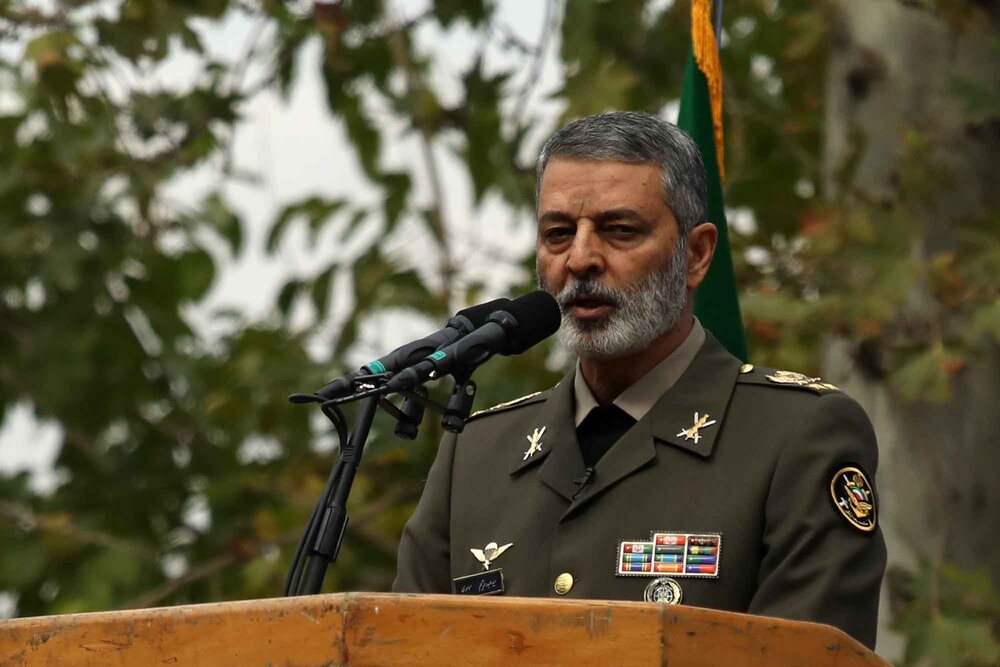So-called superpowers dare by no means to attack Iran: Army chief

TEHRAN- Even those who pretend to be superpowers do not dare to invade Iran, according to the chief of the Iranian Army, who also emphasized that the adversaries will not succeed in their "ominous goal" of undermining the Islamic Republic.
Major General Abdolrahim Mousavi declared on Monday afternoon that after more than 40 years since the Islamic Revolution "no one and no country, including those who claim to be superpowers, dare to attack Iran and even think about it."
Despite their best efforts, he asserted, the enemies will never succeed in their "vicious ambitions" of dividing Iran, sowing chaos and insecurity, undermining the production sector and the economy, or impeding the nation's advancements in science and technology.
The adversaries did everything they could to plan, coordinate, and support the recent disturbances in Iran by using money and intelligence services, he pointed out.
Separatist organizations, Persian-language satellite networks, messengers, and similar entities are also actively involved in and in charge of field command, according to Mousavi, who emphasized the significance of continuing to be attentive.
After the death of a young Iranian woman named Mahsa Amini, riots erupted in certain cities in Iran in the middle of September. The 22-year-old lost consciousness inside a Tehran police station and was declared dead three days later in a hospital.
Iranian Forensic Medicine Organization's official assessment found that Amini's death was brought on by disease rather than claimed blows to the skull or other important body parts.
Meanwhile, with the help of Western countries, particularly the United States, rioters rampaged around the state, violently assaulting security personnel and seriously damaging public property.
The Islamic Revolution Guards Corps (IRGC) and Iran's Intelligence Ministry released a joint statement toward the end of last month to emphasize the significant role that foreign intelligence services, particularly the CIA, played in organizing the violent protests.
The top commander also recalled that the Americans had acknowledged using smart phones and software to further their objectives in Iran more than ten years earlier.
"Millions of internet users, according to them, are their troops. We must exercise caution," said he.
Elsewhere in his remarks, Mousavi said few nations in the world have such a mix of technology and political independence, citing the nation's accomplishments in the military industry, notably the recent inauguration of the long-range Sayad B4 missile production line.
He asserted that the Iranian people should be aware of their country's achievements and its route to freedom since Iran's opponents are wary of its strength and prowess.
On Sunday, the Iranian Defense Ministry presented an updated version of the Bavar-373 (Belief-373) surface-to-air missile system and officially launched the Sayad B4 missile production line.
During the test, a stationary target was located at a distance of more than 450 kilometers and struck within a radius of more than 300 kilometers by the Bavar-373 system's optimized radar.
Based on reports, the detection radar range of the Bavar-373 system has grown from 350 to 450 kilometers, while its engagement range has increased from 260 to 400 kilometers.
Also on Saturday, the Islamic Revolution Guards Corps (IRGC) Aerospace Force successfully launched the Qaem-100 satellite-carrying rocket.
Qaem-100, the first of its kind manufactured by Iranian scientists, is capable of putting satellites weighing up to 80 kilograms into orbit 500 kilometers from the earth's surface.
The launch of the three-stage solid fuel suborbital carrier has been described as a symbol of “national power”.
Writing on his Twitter account on Monday, Iranian Foreign Ministry spokesman said, “The successful launch of the Qaem-100 satellite carrier was another demonstration of the national power and the ability of Iran’s young scientists for surmounting the summits of science and modern technologies.”
He said the point that makes the launch even more important is that it took place despite the enemies’ sanctions, including the United States’ so-called “maximum pressure” campaign against Tehran.
“This is the very thing that has made the Iranian nation’s known enemies angry and delirious,” Kanaani added.
